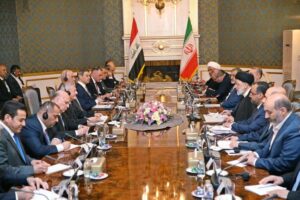
The National Interest Foundation Newsletter
Issue 190, May 5, 2023
Welcome to our NIF Newsletter. In this week’s headlines: we look into the visits to Israel by Governor Ron DeSantis and House Speaker Kevin McCarthy, examine Iran’s ongoing diplomatic campaign, explore the prospects of a peaceful solution in Sudan, and analyze changes in oil pricing and how OPEC+ will likely respond.
Written by Jacob Van Veldhuizen
American Politicians Visit Israel

The visit to Israel by Republican politicians highlights a growing rift between the Democratic Party and Netanyahu. (Photo from AP)
American Politicians Gov. Ron DeSantis and House Speaker Kevin McCarthy Visit Israel on Separate Trips
Two American politicians visited Israel with two very different goals and outcomes. Both House Speaker Representative Kevin McCarthy and Governor and potential Republican primary candidate Ron DeSantis visited Israel in a show of support for Prime Minister Netanyahu of Israel. Netanyahu is currently facing widespread protests and civil unrest as he continues his campaign to try and gut Israel’s supreme court. Of the two visits, the one far more consequential was that of Speaker McCarthy. He was joined by a bipartisan delegation during his visit. McCarthy is only the second U.S. speaker to address a full session of the Knesset, the first being Republican Newt Gingrich in 1998.
In visiting Israel, he has placed himself in the middle of a widening rift between President Biden and Netanyahu. Both Netanyahu and McCarthy are at odds with the President. Biden has rebuked the Netanyahu government for its push to gain greater control over the country’s Supreme Court and is currently battling McCarthy over increasing the United States debt limit and avoiding defaulting on its loans. Both actions have drawn heavy condemnation from Biden, who stated that Netanyahu’s government “cannot continue down this road” and that this kind of move should only be made with a broad consensus. Netanyahu has also not been invited to the White House, which is seen as traditional for every new Israeli Prime Minister to be invited. He took office four months ago. The outcome of both could have dire consequences for their respective countries. If the United States defaults on its loans, it will almost certainly lead to a global economic disaster. If Netanyahu succeeds in his attempt to gain greater control over Israel’s supreme court, it will remove an important check against the legislative branches’ power. Netanyahu also has a personal stake, as he is currently being investigated for corruption.
During his visit, McCarthy said he would be willing to invite Netanyahu to speak before Congress if Biden did not invite him to the White House. If you consider solely through the narrow optics of appealing to the Republican base, inviting Netanyahu without the consent of Biden would be seen as an attempt to make Biden appear weak and allow Netanyahu to “beat” Biden. This shallow view is a dangerous and short-sighted way to practice politics. Politically, this move would be a nightmare for both Netanyahu and McCarthy. For Netanyahu and Israel, it would further drive a wedge between the American left and Israel, potentially expediting the end of staunch bipartisan support for Israel. A similar plan was carried out in 2015 in an attempt to disrupt then-President Obama’s plans to negotiate a nuclear deal with Iran. This was a significant breach of protocol. It created a schism that remains to this day and was widely criticized in Israel as a significant breach of protocol. This would happen again if Netanyahu accepted an invitation by McCarthy to speak before Congress. McCarthy would lose any political goodwill he had remaining from the international community and the Biden administration. He will be seen supporting a corrupt leader who is leaning more and more toward authoritarian tendencies. This support would give Democrats plenty of ammunition in the upcoming to paint the Republican party in a poor light.
Governor DeSantis’s meeting, though noteworthy, officially, was about promoting trade between Israel and Florida. In reality, it was more about acquiring his foreign policy bona fides ahead of the upcoming Republican primary and Israel was just one stop on his world tour. DeSantis met with Netanyahu on Thursday last week during the former’s visit to Jerusalem. Netanyahu downplayed the meeting, with his office not mentioning it in their statements. DeSantis also gave a speech during his visit vowing to continue to support Israel, calling Jerusalem the “eternal capital of the Jewish People”, and said the United Nations unfairly criticizes Israel. His visit was largely overshadowed by his ongoing dispute with Disney.
These two different visits do have something in common, both republican politicians were attempting to win the favor of an increasingly authoritarian leader. Both DeSantis and McCarthy overlooked the massive protests against Netanyahu’s attempts to exert control over Israel’s supreme court to score political points with their base. Blindly overlooking a blatant attack on democracy not only undermines the view of the United States being the leader of the free world but also signals to other authoritarian-leaning countries that certain politicians in the United States are more than open to working with authoritarian regimes if it means they can score political points.
Iran’s Diplomatic Offensive

Iran’s diplomatic offensive has begun to yield results. (Photo from Reuters)
Iran Continues Rapprochement Efforts with Iraq and Saudi Arabia
Iran’s continued diplomatic offensive in the Middle East has begun to show promise, as multiple visits between Iranian officials and officials from Iraq and Saudi Arabia have led to warming diplomatic and economic relations. Traditional adversaries in the region, and the warming relations between these countries are a sign of changing dynamics in the Middle East. Most recently, Iraqi President Abdul Latif Rashid met with Iran’s supreme leader, Ayatollah Ali Khamenei. Rashid also meets with Iranian President Ebrahim Raisi and parliament speaker Mohammad Bagher Ghalibaf.
Iran has been exploiting a mutual disdain for the United States to court Iraq and continues to broaden their security and economic cooperation. During a meeting between himself and President Rashid, Khamenei stated “The Americans are not friends of Iraq,” and “even one American in Iraq is too many.” Along with his emphasis on expelling the United States from Iraq, Khamenei also urged for the full implementation of the bilateral security and economic agreements that were signed last month. Both countries have a desire to deepen ties and resolve differences, however, rapprochement will still likely prove to be difficult. Iran and Iraq have long been at odds. Iran was invaded by Iraq in 1979 and those wounds are still felt on both sides. After Saddam Hussein was overthrown, however, the two have slowly begun to create a relationship. This relationship will have the potential to increase stability in the Middle East.
Iran has also made huge strides in reconnecting with Saudi Arabia. These efforts were applauded by Iraqi officials during their visit to Iran. Saudi Arabia is and will likely remain a powerhouse and the Middle East. The Iraqi president rightfully stated that it will “strengthen stability and security” in the region. If all goes well for Iran, Saudi Arabia will also likely prove to be valuable in reestablishing connections with other Middle Eastern countries Iran has quarreled with in the past.
A recently China-brokered deal between Iran and Saudia Arabia has also been paying dividends. The main key to this agreement, which was signed in March, was for Iran to stop further attacks on Saudi Arabia and curtail support for militant groups that have targeted Saudi Arabia. The agreement also came with renewed hopes that the proxy war in Yemen, where the two countries support opposing sides. An end to this conflict would mean increased stability in the region and allow much-needed aid supplies to flow more freely into Yemen. The growing relationship between the two countries was especially shown when Saudi Arabia helped evacuate 65 Iranian citizens from Sudan. This sign of cooperation signals a complete reshuffling of traditional alliances in the Middle East.
As Iran continues to fill the power vacuum left by the United States in Iraq, they gain a valuable strategic advantage in the region. Iranians have growing access to Iraqi oil and development and water purification projects. They also have growing access to many Iraqi military officials who were trained and supported by the United States during the occupation. This allows Iran to collect valuable intel, such as training techniques and strategies used by the United States. Iraq has also allowed Iranian tourists to come and visit the many sacred sites for Shia Muslims. Iran is beginning to have far-reaching political, security, and cultural influence in Iraq. This new influence, coupled with its increasingly positive relationship with Saudi Arabia could lead to an entirely different Middle East. It is essential for policymakers to not dismiss these actions as performative, but rather to take the changing dynamic into account when dealing with these countries. These alliances are likely to increase the power of the members and allow for greater autonomy in their actions and significantly alter America’s ability to negotiate in the region.
War in Sudan

Fighting continues to rage in Sudan despite multiple ceasefire agreements. (Photo from AFP)
Sudan’s Civil War Continues Despite Attempted Truces
The civil war in Sudan continues to rage on despite multiple agreed-upon truces. So far, each one of these truces has failed and neither side has shown any interest in ending the conflict or coming to the negotiating table. Many international organizations and countries, including the UN, United States, Saudi Arabia, and South Sudan, have tried to mediate ceasefires or negotiations, but so far none have been effective.
The conflict has now been going on for nearly three weeks. It began when fighting broke out between General Abdel Fattah al-Burhan, the chief of the army and de-facto leader of Sudan, and his former subordinate, Mohamed Hamdan “Hemedti” Dagalo, the leader of the paramilitary Rapid Support Forces (RSF). This week, it was announced by Dafallah Alhaj, al-Burhan’s envoy that an agreement was made for the sole purpose of the ceasefire and no mediation attempts were made. Each side thinks they can win this fight militarily, so have no reason to negotiate. If enough international pressure does build up and they are forced into negotiations, whoever can position themselves more strongly militarily will have an edge in these negotiations. There is also speculation that about the leaders’ ability to control their troops. Al-Burhan could be removed by his own generals, while Hemedti’s rival, Musa Hilal, who was the former head of the RSF, could use this conflict as an opportunity to reclaim his old position. There is also an economic component to the conflict, as both leaders make massive amounts of money from a variety of different industries. The situation in Sudan remains extremely unstable and unpredictable.
The lack of any path out of this conflict is concerning. People in Sudan were already struggling with growing inflation and many were on international aid. Now much of the aid has stopped flowing into the country out of safety concerns. The little aid that does make it in is not nearly enough to support the now-growing refugee population. Countries have been working to get any of their citizens out of the country. The civilians in Sudan are on their own. Forces often shelter in civilian buildings, putting the civilians in the line of fire. Only a third of the hospitals in Khartoum, the capital of Sudan where most of the fighting is taking place, are currently operational. Those that remain open are running dangerously low and medical supplies and the staff are exhausted. Many of the gunshot victims that come in have sustained multiple wounds, indicating that they are being specifically targeted. As resources become scarcer, gangs have also become a growing factor, looting supplies. People living in the conflict zone are faced with an impossible choice. They must choose to risk starving if they remain, or risk being gunned down if they try to leave. There have been multiple reports of each happening. Reliable information is also hard to come by, further complicating any attempts to escape or gather resources
Neighbors are helping neighbors in Khartoum, but it is often not enough. Any attempts to mediate the conflict have been ineffective. New, innovative, and likely unorthodox methods need to be implemented to end this conflict. Each side is evenly matched, and will likely keep fighting until either that changes or an outside force makes continuing the fight less attractive. A potential solution may include sanctioning the leaders’ sources of income and pushing them to reach a peaceful solution to continue their operations. Though historically ineffective. Sanctions have the opportunity to force the warring sides to the negotiating table. It is important that if sanctions are implemented, they are done so carefully and in a way where they cannot be circumvented and do minimal harm to the civilian population.
Oil Price Drop

Oil prices continue to fall due to an unstable economic future. (Photo from Reuters)
Oil Prices Drop Despite OPEC+ Production Cuts
Oil prices have continued to slump over concerns about the economy as politicians in the United States continue to debate over ways to avoid a debt default. Prices will likely continue to fall despite multiple cuts in production implemented by counties in OPEC+. OPEC+ made these cuts in production in an attempt to get out ahead of the economic uncertainty, but so far it appears to have been ineffective. These voluntary cuts, which amount to about 1.16 million barrels a day, went into effect at the beginning of May. They will last till the end of the year.
The main contributing factors to the fall in prices are China’s unexpected dip in manufacturing activity and the possibility that the United States Federal Reserve may raise the interest rate again. Recent bank failures have also fed continued fear of an upcoming economic decline. Concerns about diesel demands in recent months have also contributed to the dip. Prices have fallen by nearly 5% dipping below $70 per barrel.
OPEC+ has been cutting its output frequently in the past year. The most contentious of which took place last October, when the group agreed to cut 2 million barrels per day. This move angered Washington as a tighter supply raises oil prices. The United States argues that oil prices need to remain low to prevent Russia from earning more revenue to continue to fund its invasion of Ukraine. There is also a domestic element, as a difficult election cycle grows near for Democrats, lower gas prices will likely cast the Biden administration and the Democrats in a more favorable light.
It will remain to be seen how long this dip lasts, as OPEC+ is likely to continue to decrease supply to bring prices back up. However, this will be a difficult balancing act, as many member countries’ economies depend heavily on oil production. If the production is cut too low, it could have dramatic consequences for member states. Economic consequences lead to a whole range of problems for member countries, as economic crises often lead to public unrest. Poor economic conditions were a major catalyst for the Arab Spring and many other revolutions around the world.
Some oil-producing nations, like Iran, are increasing production, recently surpassing 3 million barrels a day. Russia pledged to cut its production by 500,000 barrels a day, but there has been no substantial drop in production yet. These breaks from the agreed-upon reduction in production could indicate a potential rift in OPEC+, which could have political implications. Past disputes between members of OPEC have caused oil prices to fluctuate drastically and caused harm to some members’ economies. The fallout from this type of behavior is rarely limited to economics. Countries are often punished politically if they do not fall in line with OPEC’s wishes.
This situation must be monitored closely by analysts in the United States. The United States is the second largest consumer of oil in the world, only being between out by China. Any disruption to that supply or drastic change to the price could send shockwaves through the global economy, affecting people around the world.
